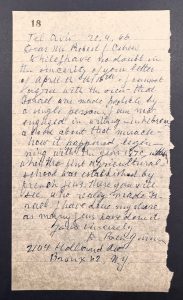Hatikvah (The Hope) was written in 1878 as a nine-verse poem by Naphtali Herz Imber. The poem became the lyrics of the Zionist anthem and later the anthem of the State of Israel.
Born in what is now Ukraine, Imber moved to Palestine in 1882, departing in 1889 for Europe and winding up in the United States in 1892. He roamed across America, developing legend around him as the first Hebrew beatnik. He died penniless in New York in 1909, but was so beloved by the local Jewish community that when his remains were being transported for burial in Queens, the streets were lined with throngs of people singing Hatikvah. He was re-interred in Jerusalem in 1953.
This sheet music was printed by R. Mazin and Co. in London’s East End during the 1920s. Raphael Mazin moved to London from Russia around 1895 with his wife and four children and four years later opened a bookstore which also sold music and other Jewish related items. His family grew to seven children, with the expanding family living above the shop. The store remained in business until 1970.
The Hatikvah that we sing today is different from the version written by Imber. He wrote:
Our hope is not yet lost, the ancient hope to return to the land of our fathers
To the city where David dwelled
In 1905 this phrase was changed by Yehuda Leib Metman Hacohen, a Rishon LeZion schoolteacher, to:
Our hope is not yet lost, the hope of 2,000 years
To be a free nation in our land, the land of Zion and Jerusalem
With the cascade of events that have befallen the Jewish people and Israel in the last nine months, hope remains critical but may also be in short supply. Perhaps you may find the following to be a helpful source of inspiration:
We don’t have hope. We make hope. By making our own hope, it will never be lost.







